North Korea – Calling the Bluff or Nuking the World? : A Well Thought Out Scream by James Riordan
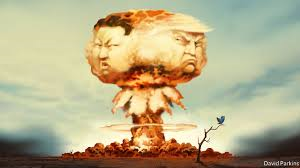
In high stakes poker the best players are always the ones with the icy veins and glazed eyes. Try as you might, you can’t figure out whether they got a Royal Flush or a pair of twos. They’ve master the poker face – the art of being unreadable. This does not seem to be the case at the World Leader’s Table. Hotheads and wild cards seem to be holding the best cards today and much of the world is starting to wonder who is going to blink first.
Perhaps an even better analogy is like when you were a kid and the neighborhood loudmouth started calling you out. He was a punk and you both knew it, but just when you were about to teach him a lesson his HUGE big brother comes walking up.
The loudmouth punk here is Kim Jong-un of North Korea who never seems to tire of firing off ridiculous threats to the United States. The threats are ridiculous because he knows and we know that if we were really going to cut loose, we could squash him like a bug. The problem for us is that his big brother is China and a conflict with them would likely prove to be really nasty for both sides. China is end a very difficult position. With the leaders of North Korea and the United States threatening to blow each other off the globe, U.S. war planes – both fighters and bombers are engaged in a show of force right off the coast of China. The Chinese keep asking everyone to calm down but behind closed doors, their bond with North Korea is starting to wear thin.
As North Korea’s primary trading partner, China is widely viewed as the key to solving the standoff, but it seems like their influence over North Korea is bottoming out. Trying to keep everyone happy, China has agreed to the United Nations sanctions of Korea and implemented them with what seems like real determination. But North Korea is not too happy about it. “The North Koreans have figured out that the Chinese are genuinely in a bind,” said Euan Graham, director of International Security Program at the Lowy Institute in Sydney. “Having cried wolf for so long about having limited influence, the Chinese genuinely do have limited influence in North Korea right now. It’s not just weasel words.”
The importance action that China keeps hesitating on is to cut off crude oil exports to North Korea, but taking that step seems to be getting closer. On Saturday, China announced that it would limit exports of refined petroleum products, and ban exports of condensates and liquefied natural gas, to comply with the latest U.N. sanctions. It will also ban imports of textiles from North Korea. How far will they go. It’s not likely that China will do anything that might bring down Kim Jong-un, because that could lead thousands and thousands of refugees pushing across their border and unifying the peninsula under an American-friendly government. Of North Korea’s leadership knows this and that is why they keep calling China’s bluff.
But just in case, they are also thought to have stockpiled between six and nine months of oil supplies: enough to keep the military and key industries going for some considerable time, Graham said.
On Saturday, North Korea’s foreign minister warned that a strike against the U.S. mainland is “inevitable” because President Trump mocked leader Kim Jong Un with the nickname “little rocket man.”
In response to Ri Yong Ho’s threats at the U.N., Trump tweeted: “If he echoes thoughts of Little Rocket Man, they won’t be around much longer!”
U.S. bombers, escorted by fighter jets, flew off the North Korean coast in a show of force on Saturday, while in Pyongyang, tens of thousands of people staged a mass rally to express support for “final victory” over the United States and call for the annihilation of the enemy, the state Korean Central News Agency reported.
“This is a disaster for all parties, and for China for sure,” said Lu Chao, a Korean Peninsula expert at the Liaoning Academy of Social Sciences in Shenyang. “Although there is no imminent sign of an outbreak of war, partial conflicts, especially between the South and North Korea on the sea where boundaries are not set, are very likely to occur.
Peter Reft/AFP/Getty Images An Air Force B-1B Lancer refuels near the East China Sea last week.
On top of all this North Korea released a propaganda a doctored video and photos that also showed a North Korean missile destroying two US jets. The computer generated footage shows the U.S. planes exploding in a huge firestorm. The images were from a state-owned propaganda site, DPRK Today and released hours after US Air Force B-1B Lancer bombers, despatched from Andersen Air Force Base in Guam flew close to North Korea’s east coast. The bombers were accompanied by US Air Force F-15C Eagle fighter escorts that came from Okinawa, Japan, according to Yonhap News agency. Saturday’s airborne mission was the furthest north of the demilitarised zone separating North and South Korea that any US fighter aircraft has ventured into this century. Also in the video, there are scenes of a North Korean submarine-launched missile scoring a direct hit on the USS Carl Vinson, a nuclear-powered supercarrier.
The film issues a stern warning to the United States, with subtitles stating: “Should F-35, B-1B and the Carl Vinson lead the US attack, they will head to the grave in that order.” North Korea has a long history of creating propaganda videos using computer-generated technology. These include a simulated attack on the White House and one of President Trump standing in a graveyard.
Anti-US sentiment remains strong in Pyongyang, where a huge rally was held on Saturday, according to AP. Tens of thousands gathered in Kim Il Sung Square to hear speeches from officials. Demonstrators shouted out “total destruction”, while students held signs with slogans saying “death to the American imperialists.” North Korea’s official news agency KCNA said that more than 100,000 people attended the mass protest.
“We are waiting for the right time to have a final battle with the US, the evil empire, and to remove the US from the world,” said Ri Il-bae, a commanding officer of the Red Guards, reported KCNA. “Once respected Supreme commander Kim Jong-un gives an order, we will annihilate the group of aggressors.”
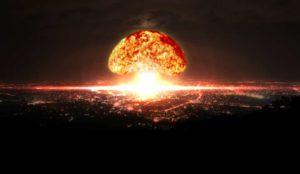 Again, the real question is what will China do? Next month, China’s Communist Party leadership meets for a key Congress where President Xi Jinping is due to be confirmed for another five-year term as Communist Party General Secretary.
Again, the real question is what will China do? Next month, China’s Communist Party leadership meets for a key Congress where President Xi Jinping is due to be confirmed for another five-year term as Communist Party General Secretary.
At home and abroad, there has been a massive effort to project confidence and control, and to ensure calmness and stability, in the run up to this meeting. That effort has been felt in every arm and at every level of government here. But Pyongyang simply isn’t listening.
Its sixth and most recent nuclear test was staged earlier this month at a time when Xi was hosting leaders from BRICS (Brazil, Russia, India, China, South Africa) nations at a key summit — an insult the face-conscious Chinese would have felt deeply.
Xi has never met Kim, and the two men are believed to hold each other in contempt. China’s attempts to send an envoy to Pyongyang to calm the situation have been rebuffed.
Some experts say Beijing has only itself to blame, for helping North Korea in the past and allegedly enabling the regime to develop its missile program. Yet there is no doubt it is now paying a price.
China has watched in alarm and anger this year as South Korea installs an American missile defense system that it fears could be used to spy on Chinese territory. It will also not have welcomed U.S. warplanes flying close to its shores this weekend.
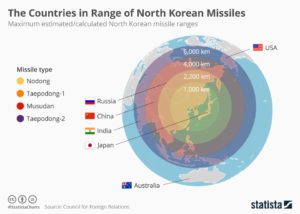 South Korea’s presidential office said Seoul and Washington had coordinated closely over the deployment of the U.S. bombers, calling it one of the most effective countermeasures against the advancement of North Korea’s nuclear and missile programs, South Korean media reported.
South Korea’s presidential office said Seoul and Washington had coordinated closely over the deployment of the U.S. bombers, calling it one of the most effective countermeasures against the advancement of North Korea’s nuclear and missile programs, South Korean media reported.
While Seoul cooperates with Washington, Pyongyang is freezing out Beijing.
On Saturday, KCNA issued a list of diplomatic missions that had held celebrations earlier this month to mark the 69th anniversary of the founding of the Republic. The list included 17 nations — but pointedly not China.
The deterioration in relations between Beijing and Pyongyang erupted much more forcefully into the open on Friday when KCNA angrily rebuked their Chinese state media counterparts for threatening, insulting and undermining their country. In a piece entitled “Rude Deed of Shameless Media,” it took aim at Chinese Communist Party mouthpiece the People’s Daily for arguing in favor of sanctions.
“The party organ of the socialist country bragging long history denounced socialist Korea so maliciously in collusion with the imperialists” KCNA wrote. “This leaves us think that whether they can be entitled to enter the coming party conference hall only when they register the dirty reptile records of betraying the peoples of the two countries.”
In China, experts said North Korea has resolved to continue develop its nuclear and missile program — at least until it can put a nuclear warhead on a missile capable of reaching the United States — despite whatever external pressure was applied.
“Sanctions, in my view, will not reverse North Korea’s resolute determination,” said Shen Dingli, deputy dean of Fudan University’s Institute of International Studies in Shanghai.
But Lu at the Liaoning Academy of Social Sciences insisted sanctions would work — at least by encouraging North Korea to one day return to talks.
“The sanctions that have been imposed will have a significant impact on North Korea’s economy, making them reconsider benefits and losses, and choose between being an enemy of the international community or sitting back at the negotiating table,” he said.
“I believe that one day North Korea will be at the table. ”


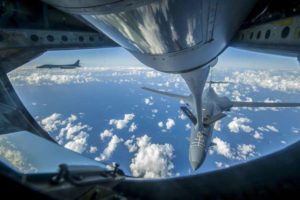

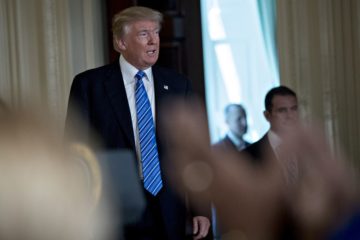
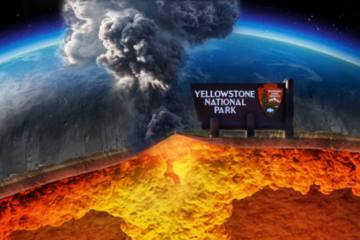
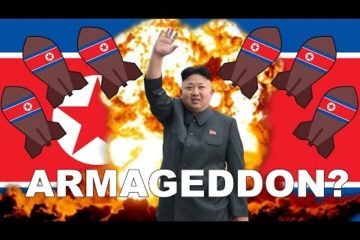

No Comment